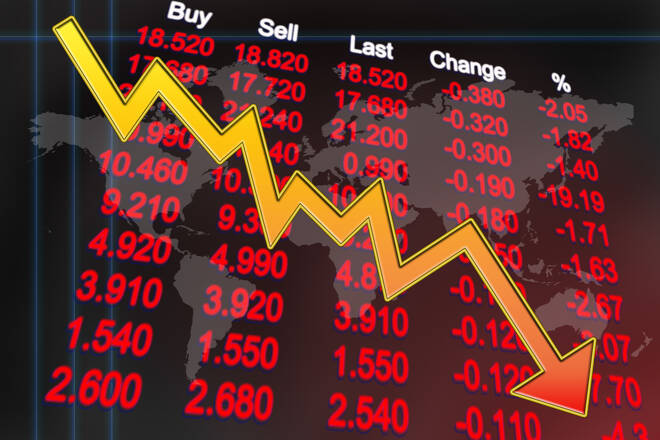Advertisement
Advertisement
Asia-Pacific Shares Pressured by Liquidity Fears in China, US Stimulus Worries
By:
China’s blue-chip stock index fell on Tuesday, marking its biggest daily loss since September after touching a 13-year high in the previous session.
The major Asia-Pacific stock indexes finished lower on Tuesday, with Hong Kong shares posting the biggest losses among the region’s major markets. Markets in Australia were closed for a holiday.
There wasn’t a central theme in the markets either with Hong Kong investors reacting to a big drop in Chinese tech giant Tencent, Chinese shares tumbling amid speculation of policy tightening and South Korea falling on liquidity fears in China and U.S. stimulus worries.
Cash Market Performances
In the cash market on Tuesday, Japan’s Nikkei 225 Index settled at 28546.18, down 276.11 or -0.96%. Hong Kong’s Hang Seng Index finishing at 29391.26, down 767.75 or -2.55% and South Korea’s KOSPI Index closing at 3140.31, down 68.68 or -2.14%.
Australia was closed, but in China, the Shanghai Index settled at 3569.43, down 54.81 or -1.51%.
Hong Kong Shares Close 2.5% Lower as Stimulus Concerns Dent Risk Appetite
Hong Kong shares slumped 2.5% on Tuesday, pulling back sharply from the previous session’s rally, as global investor concerns over the timing of aggressive U.S. stimulus and rising Sino-U.S. tensions whacked risk appetite.
Investors are jittery about the timing of U.S. stimulus, with Senate Democratic Majority Leader Chuck Schumer warning a stimulus bill may not pass for four to six weeks.
China-U.S. relations also continue to weigh on sentiment. China said Tuesday it will conduct military exercises in the South China Sea this week, just days after Beijing bristled at a U.S. aircraft carrier group’s entry into the disputed waters.
The Index was also pulled lower by Tencent Holdings Ltd, which fell 6.26% a day after heavy buying by mainland investors drove it nearly 11% higher.
China Shares End Lower Amid Speculation of Policy Tightening
China’s blue-chip stock index fell on Tuesday, marking its biggest daily loss since September after touching a 13-year high in the previous session, amid tightening liquidity conditions and Sino-U.S. tensions.
Financial firms came under pressure against a backdrop of tightening liquidity conditions. Short-term rates jumped to pre-COVID levels on Tuesday, with some investors speculating that the central bank might adopt a tightening bias in its monetary policy.
South Korea Shares Drop on Liquidity Fears in China, U.S. Stimulus Worries
South Korean stocks fell on Tuesday as foreign investors turned net sellers due to liquidity fears after China’s central bank withdrew cash from its banking system and as uncertainty over a U.S. stimulus package lingered.
Short-term borrowing costs in China jumped to their pre-COVID-19 levels on Tuesday, pressured by the combination of the central bank’s extended net drain of cash from the financial system and higher holiday demand.
For a look at all of today’s economic events, check out our economic calendar.
About the Author
James Hyerczykauthor
James Hyerczyk is a U.S. based seasoned technical analyst and educator with over 40 years of experience in market analysis and trading, specializing in chart patterns and price movement. He is the author of two books on technical analysis and has a background in both futures and stock markets.
Advertisement
